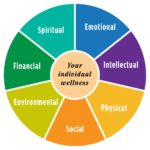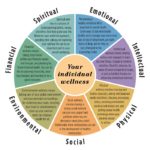This is Phys. Ed. taken to the next level.
–
Table of Contents:
- Comparison
- Vocabulary
- Progression
- 2023 Update: Astrology
- 2024 April/+
- Conceptual Images
–
Comparison:
Physical Education (Phys’ Ed’) classes teach the basics; how the body moves, which sports and exercise styles are available in our realm, and how to recover from a sports/workout-related injury.
Fitness teaches how to use Phys. Ed. knowledge to become fit, not just to try physical activities in general.
Holistic wellness helps achieve not only fitness, but peak fitness and balance throughout one’s entire life/lifestyle.
Once you have achieved not only general/physical wellness, but holistic/complete wellness, your body tends to start doing amazing things (that some never knew possible, let alone expected or even asked/hoped for). One of these is known as the activation (or awakening) of the kundalini; this means there is a part of your central nervous system (though some would say it is a second energy-system, separate from the central nervous system) that can stay dormant for years, and, once you have aligned certain subtle parts/organs of your body, it is able to release an incredible amount of useful and pleasing energy into you –and out in offering to many beings around you.
–
Vocabulary:
- acupuncture (& acupressure) –though these are only taught with specifics (points, combos, etc.) in another class
- awareness
- health
- holistic
- journaling
- mindfulness
- Neuro-Emotional Technique (NET)
- potential
- routine
- sleep-hygiene
- wellness
More TBA…
–
Progression:
First we inspect and balance our own body/ies, then our brain/mind/s, then our income and work-life balance, then determine where we are “in our element”, and finally with whom there we spend the bulk of our time. We don’t always have to go in that order, though; sometimes a given person/client already has some or even all but one of these areas of his/her life “figured out” and stabilized. Sometimes all it takes is making a small adjustment to one or two of the following areas.
- reviewing one’s own physical concerns/goals
- reviewing one’s own intellectual/mental concerns/goals
- reviewing one’s own emotional concerns/goals
- reviewing one’s own spiritual concerns/goals
- reviewing one’s own financial concerns/goals
- reviewing one’s own environmental concerns/goals
- reviewing one’s own social concerns/goals
- tying them all together
- considering work (or even a career) in life-coaching
This sequence/method often finds and eliminates root-causes of stress, thereby helping to mitigate and eliminate diseases and even injuries, over time, without surgery or medication. This is why this class is separate from Phys. Ed.; it goes well beyond just how the body moves during sports and play. Holistic Wellness is a philosophy and approach which helps us diagnose and cure (not just treat the symptoms of) many, if not all, of life’s problems/challenges.
More TBA…
–
2023 Update: Astrology
In our (fitness &) holistic wellness courses, we teach how you can use your astrology data to become and stay balanced in your own life. This is healthcare, just focused on self, and is foundational and preventative, not based on healing from an ail or accident.
–
2024 April/+
Focuses/Sections:
Physical concerns/goals:
- range of motion
- stamina
- environmental/location limitations/parameters
- mental image of ideal body/self
- past injuries
- holistic methods sampled/tried in the past
- exercise/gym schedule
Reviewing one’s own intellectual/mental concerns/goals:
- determining your learning style
- determining your recall/recollection style
- determining your memorization capacity
Reviewing one’s own emotional concerns/goals:
- natural emotional reactions to various stimuli; events, individuals, locations/environments, situations, smells, sounds, temperatures, etc.
- if emotional self-control is desired
- any practice at emotional regulation/harnessing (mention: “each emotion in a jar on a shelf” mind technique/trick)
- note: “feeling” might be used colloquially as a synonym of “emotion”, but here we differentiate the two by using “feeling” to mean “touch; what you literally feel with that sensory perception” vs. “emotion” being “your feelings inside; mood; happiness, etc.”
Reviewing one’s own spiritual concerns/goals:
- beliefs you may already have
- if you were taught someone else’s beliefs (i.e. indoctrinated/recruited into a religion, rather than being shown how to be individually spiritual)
- whether you feel or desire “a calling” (a guiding idea/sensation beyond the daily/regular feelings/emotions); your own personal compass-needle attractor, so to speak
Reviewing one’s own financial concerns/goals:
- whether you feel comfortable/’right’ with the amount of funds/money (and/or other assets/investments/wealth) you have
- how you might want to pursue/gain additional money/funding
- fundraising efforts in your past that worked vs. those that didn’t work as well as you would have liked
Reviewing one’s own environmental concerns/goals:
- whether living and/or working in a place, or places, which resonate/vibe well with you, thus synergizing with you, not distracting/hurting/sickening/upsetting you
- how you might be able to improve your environment, if you are not yet able to relocate
- where you have researched and considered relocating to, if it doesn’t seem you can improve the environment where you are
Reviewing one’s own social concerns/goals:
- whether the society you are in has resulted in the relationships and hobbies/events your instinct has been urging you to find/start
Tying them all together:
- how funding makes it easier to spend time learning about and sampling things in all those other categories
- how cultivating your own spirituality leads to much more energy and confidence/certainty when it comes to knowing what to sample first and next, even when there are so many options in the world/reality
Considering work (or even a career) in life-coaching:
- Do you enjoy working with people who know less about topics you know more about?
- How patient are you with students and general seekers of knowledge?
- What pay rate would you need to be able to live on income from this type of job?
- Is there a demand/desire in your area/homeland for life-coaches?
- Have people already asked if you do life-coaching?
- Can you commit to your clients for long-term business relations if that is what they need/seek?
–
–



